Russia looks to build on combined efforts
During last week’s state visit to Vietnam by Russian President Vladimir Putin, where he met with the country’s top leaders, both nations released a joint statement highlighting a future cooperation orientation covering many sectors, with importance attached to more economic cooperation.
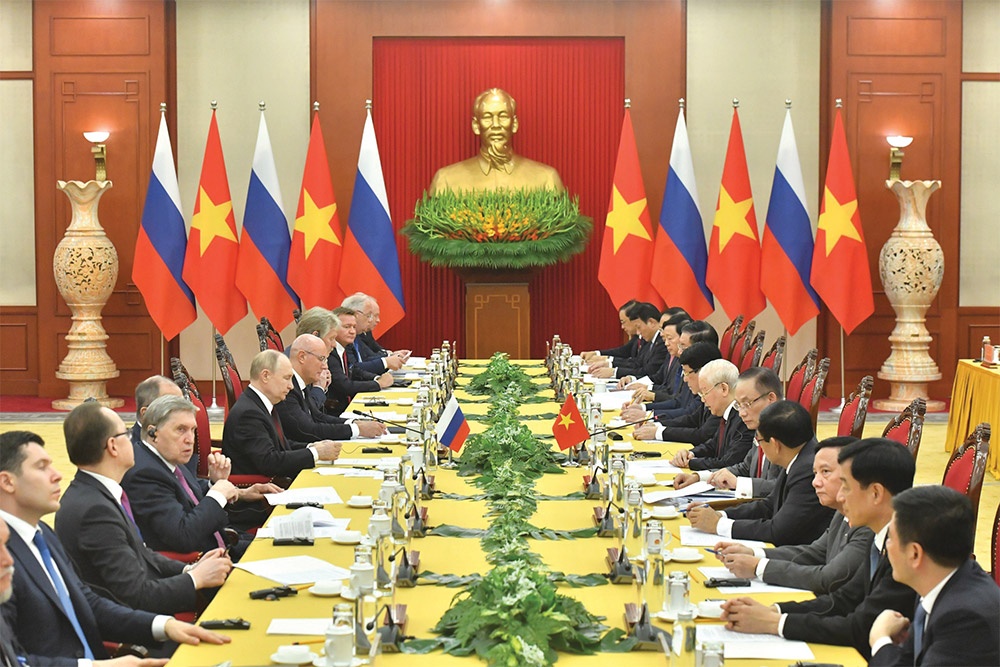 |
“Both nations will facilitate the expansion of ties in trade, investment, and finance-credit in line with international laws and the two countries’ legal regulation, with an aim to boost goods exchanges in balance and to effectively exploit the advantages of a free trade agreement between Vietnam and the Eurasian Economic Union,” read the joint statement.
Vietnam and Russia also affirmed the strong need to increase their mutual investment flows into their respective territories in the sectors of natural mineral exploitation and processing, industry, agriculture, mechanics, and energy. A list of prioritised projects will be determined by a joint high-level taskforce.
President Putin said he supports Vietnam’s proposal on a plan to soon implement some Russian iconic large-scale projects about infrastructure, railway, train, metro line, and renewable energy in the Southeast Asian nation.
Especially, both nations stated that they “will continue cooperating in the framework of the existing oil and gas projects and new ones, including the supply and processing of crude oil and liquefied natural gas (LNG) for Vietnam.
“Favourable conditions and support are to be created for the expansion of operations of Vietnamese oil and gas companies in Russia and of Russian oil and gas companies in Vietnam’s continental shelf in line with the laws of Vietnam and Russia, and international laws as well,” read the joint statement.
“Energy is still a strategically important sector in the two countries’ bilateral cooperation. The joint venture Vietsovpetro has been exploiting oil in Vietnam’s continental shelf over the past more than 40 years, with high effectiveness,” said President Putin. “The volume of oil produced by Vietsovpetro over the past years has exceeded 250 million tonnes.”
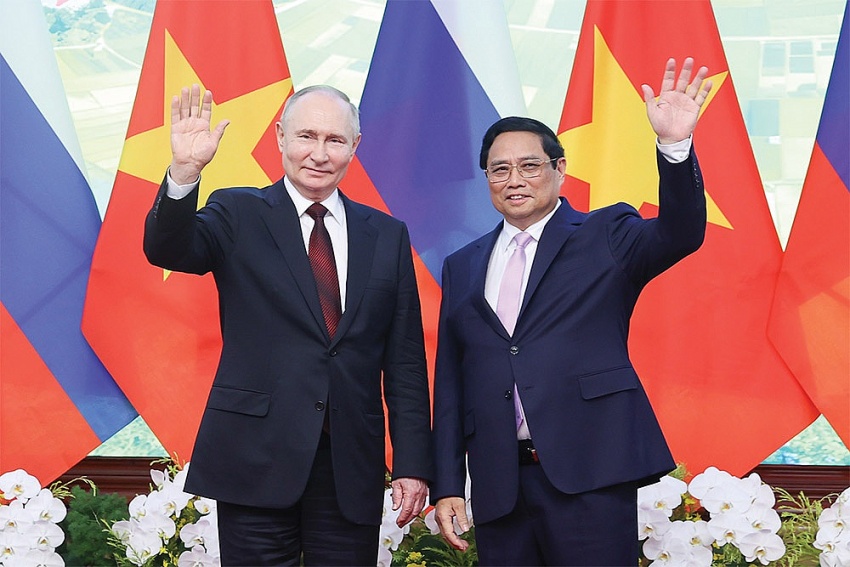 |
| Russian President Vladimir Putin (left) met with Vietnamese Prime Minister Pham Minh Chinh in Hanoi, Photo:Thach Bac |
Expanding capacity
The Russian leader added that the joint venture Rusvietpetro established in 2008 “is also successfully operating in Russia’s Nenets autonomous okrug. Facing difficulties in the extreme north, Rusvietpetro has exploited over 35 million tonnes of oil. Meanwhile, Gazprom is exploiting gas in Vietnam. Another Russian giant, Novatek, is also planning to implement LNG in Vietnam.”
Novatek has inked a memorandum on cooperation with PetroVietnam, while Zarubezhneft has obtained a licence to develop Block 11.2 on Vietnam’s continental shelf.
Also, hydroelectric power generation company RusHydro intends to help expand the capacity of hydroelectric power stations on Vietnamese rivers. According to the Russian president, a joint Russian-Vietnamese project to construct a 1,000MW offshore wind power plant in the south-central province of Binh Thuan has been added to the eighth Power Development Plan.
Vietnam’s Ministry of Industry and Trade and Russia’s Ministry of Energy recently conducted a review of all bilateral energy and oil and gas projects, while also agreeing on a new major cooperation orientation. The two ministries have also inked the revised protocols for an inter-governmental agreement on operation of Vietsovpetro and Rusvietpetro.
Vietnam and Russia also take into account the potential cooperation in atomic energy, with strong determination raised to implement a project to build a nuclear technology science centre in Vietnam.
The two countries last week signed 11 documents aimed at expanding bilateral cooperation in many sectors such as energy, transport, higher education, transport, justice, customs, finance, and science and technology.
Over the past years, Vietnam and Russia have been exploring more measures to boost their investment and trade ties. For example, Vietnam and the Russian Direct Investment Fund are seeking to increase investment cooperation, including the fund’s plan to promote and support direct investment between the two countries, and also with third nations.
The fund is Russia’s $10 billion sovereign wealth fund, established in 2011 by the Russian government to make investments in leading companies in high-growth sectors of the Russian economy.
According to a priority list for jointly implemented Vietnam-Russia projects, there are 17 already approved by both countries. They will be implemented in the sectors of oil and gas, transport, agriculture, electricity, construction, industry, and high technology. Vietnam and Russia are devising a roadmap for the deployment of these projects.
“We hope that Vietnamese investors will be more active in boosting investment in Russia. For instance, TH Group is taking advantage of opportunities in our country to develop a gigantic milk processing project,” President Putin said.
Currently, Vietnamese investors are investing in 25 Russian projects, registered at nearly $3 billion.
Contributing to ties
TH Group is Vietnam’s biggest investor in Russia in the agricultural sector, with a gigantic $2.7 billion high-tech centralised dairy farming and processing complex.
At present, two farms have been put into operation, with the total number of dairy cows being over 6,000. Another farm is under construction in Moscow and a milk processing factory is being completed in Kaluga province.
In May, TH Group also commenced construction of a $216.7 million high-tech centralised dairy farming and milk processing project in the far eastern region of Russia. This project includes a 6,000-cow farm, a 250-tonne-of-milk-per-day factory, and a material area of 13,000 hectares. “We want to contribute to the Vietnam-Russia trade and investment ties flourishing,” said Ngo Minh Hai, chairman of TH Group’s Board of Members. “We commit to speeding up the construction so that the project can become operational by late 2027.”
Early this year, an air route to Russia’s far eastern region was initiated in a bid to develop tourism, trade, and investment ties.
According to the Vietnamese Embassy to Russia, the Russian economy is now in need of importing a large volume of goods, and it is willing to purchase more of goods from Vietnam.
The General Department of Vietnam Customs reported that total export-import turnover between Vietnam and Russia reached $3.63 billion in 2023, including $1.74 billion earned by Vietnam’s exports – up 12 per cent on-year.
Vietnam’s main exports to Russia include seafood, vegetables, fruits, nuts, coffee, tea, pepper, rice, handicrafts, rubber, wood furniture, footwear and electronics. Vietnam imports from Russia large amounts of wheat, fertiliser, oil and chemicals, pharmaceutical supplies, steel and heavy machinery.
| Dang Minh Khoi, Vietnamese Ambassador to Russia
In 2012, Vietnam and Russia forged a comprehensive strategic partnership. In 2015, Vietnam and the Eurasian Economic Union inked a free trade agreement, facilitating the development of the mutual economic-trade and investment cooperation. After this deal took effect in 2016, bilateral trade strongly developed, sitting at $5.5 billion in 2021, up 90 per cent against 2016. However, since the Russia-Ukraine conflict broke out, the world’s political-economic situation becoming complicated had a negative impact on the economic-trade ties between Russia and Vietnam. Together with shared efforts of authorised agencies and the business communities of both nations, difficulties in transportation and payment have gradually been removed, creating a clear change in export and import activities. In 2023, bilateral trade turnover increased 3.6 per cent over 2022. In the first five months of this year, the turnover hit approximately $2 billion, up 52 per cent on-year. Many groups of Vietnamese key exports such as agro-aquatic products, garments, and machinery and equipment continued their high increases in Russia. Meanwhile, Vietnam also raises import of many products from Russia, such as coal, fertiliser, mechanical, and foodstuffs. The traditional cooperation in oil and gas has continued being maintained and strengthened, with two typical enterprises including Vietsovpetro and Rusvietpetro operating effectively. The investment ties in other fields such as foodstuff processing, and automobile manufacturing and assembly are also developing. Over the past time, Vietnam and Russia are also gradually resuming cooperation in other sectors which were interrupted by the pandemic. Early this year, both nations re-opened a direct air route between Moscow and Ho Chi Minh City, with a frequency of three flights a week. At present, both countries have loosened visa regulations for their respective citizens. Since August 2023, Vietnamese citizens have been able to apply for an e-visa into Russia with a simple process. Meanwhile, Russian tourists have also been able to stay in Vietnam visa free within 45 days. These are favourable conditions for enterprises of both nations to recover and boost tourism and trade cooperation in the coming time. Over the past few years, in defiance of numerous difficulties due to sanctions and embargoes from the western countries, Russia has continued to maintain its relatively high economic growth, becoming the world’s fourth-largest economy as calculated based on the purchasing power. Given that, in addition to tradition cooperation sectors, Vietnamese enterprises have many opportunities to increase cooperation with Russian partners in the sectors of industry, high technology, IT, e-commerce, and pharmacy. It is suggested that businesses of the two countries further strengthen trade promotion and partake in specialised exhibitions in Russia and Vietnam in order to seek more partners and forge business and investment relationships. |
 | Vietnam and Russia’s strong energy Vietnam and Russia are warming up bilateral economic cooperation. Ngoc Linh reports. |
 | Vietnam and Russia open doors for heightened cooperation Vietnamese and Russian companies are increasing cooperation and more and more opportunities are opening to Vietnamese and Russian enterprises to form mutually beneficial partnerships. |
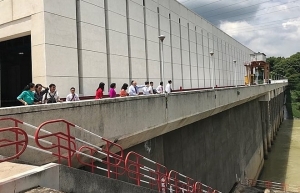 | Tri An hydropower plant – Landmark in Vietnam-Russia friendship The traditional friendship and comprehensive strategic partnership between Vietnam and Russia, and Tri An Hydropower Plant – a landmark in the bilateral relationship – were highlighted at a meeting in the southern province of Dong Nai on June 18. |
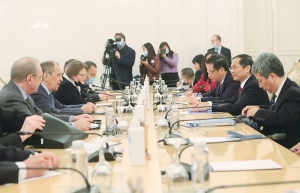 | Commitments made for expansion of Russian ties Vietnam and Russia are seeking out ways to beef up their trade and investment ties which are on the rise, with the Vietnam-Eurasian Economic Union Free Trade Agreement serving as a big driver. |
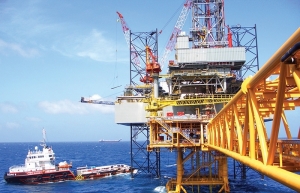 | Russia reinforces Vietnam connection Vietnam and Russia are further amplifying their trade and investment cooperation ties, with the Vietnam-Eurasian Economic Union Free Trade Agreement functioning as a big driver. |
What the stars mean:
★ Poor ★ ★ Promising ★★★ Good ★★★★ Very good ★★★★★ Exceptional
Related Contents
Latest News
More News
- Kurz Vietnam expands Gia Lai factory (February 27, 2026 | 16:37)
- SK Innovation-led consortium wins $2.3 billion LNG project in Nghe An (February 25, 2026 | 07:56)
- THACO opens $70 million manufacturing complex in Danang (February 25, 2026 | 07:54)
- Phu Quoc International Airport expansion approved to meet rising demand (February 24, 2026 | 10:00)
- Bac Giang International Logistics Centre faces land clearance barrier (February 24, 2026 | 08:00)
- Bright prospects abound in European investment (February 19, 2026 | 20:27)
- Internal strengths attest to commitment to progress (February 19, 2026 | 20:13)
- Vietnam, New Zealand seek level-up in ties (February 19, 2026 | 18:06)
- Untapped potential in relations with Indonesia (February 19, 2026 | 17:56)
- German strengths match Vietnamese aspirations (February 19, 2026 | 17:40)

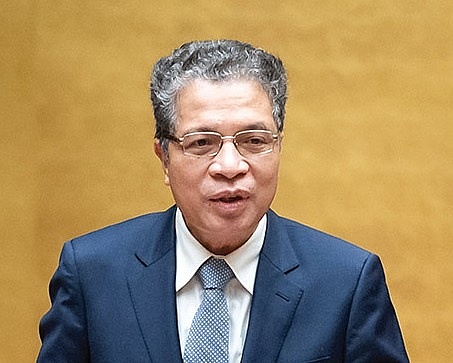
 Tag:
Tag:




















 Mobile Version
Mobile Version